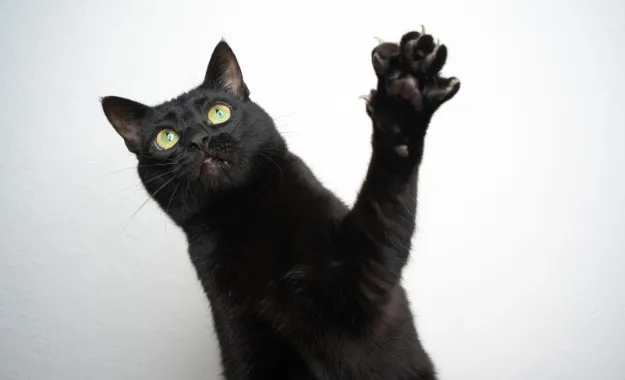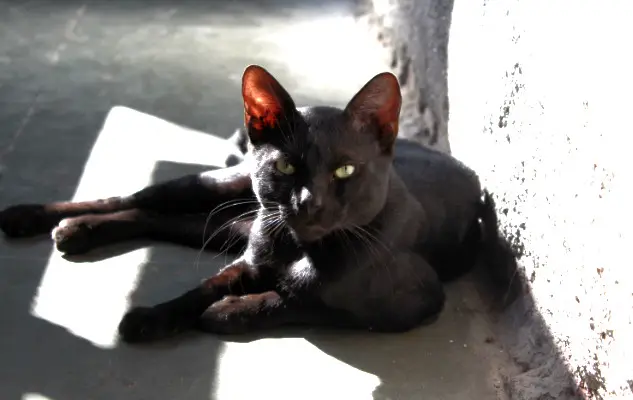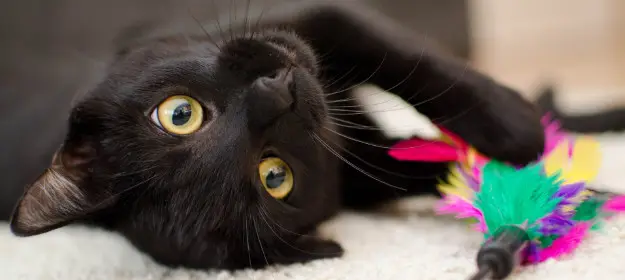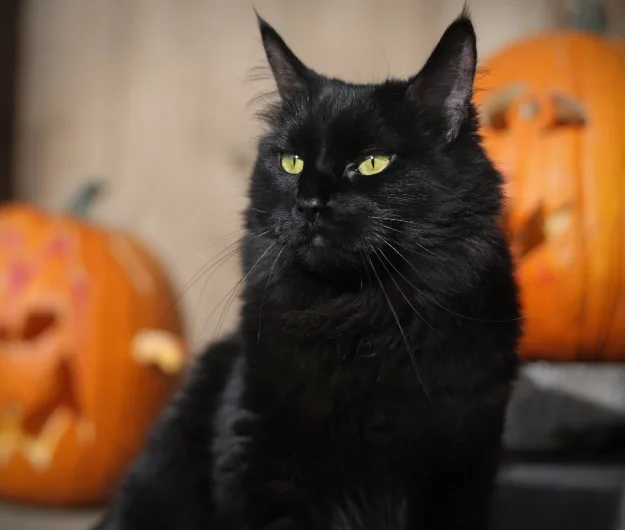Superstitions and myths about black cats.
Throughout human history, myths about black cats have formed all over the world. In many places, superstitions still prevail, even though there is no scientific evidence for them. Myths about black cats originate from the Middle Ages in Europe, when they were associated with witches and black magic. Unfortunately, many myths still portray them in a negative light today. Many prospective pet owners do not choose to adopt or buy black cats. Consequently, black cats in shelters often wait much longer for a home than other cats.
Myths about black cats in history
In the Middle Ages, it was believed that black cats were witches' familiars, supposedly representing a direct link to the devil. They were often associated with the spread of diseases, although rats were mostly blamed for the spread of the plague. The persecution of witches and their "animal companions" intensified in the 15th and 16th centuries, when black cats became a symbol of alleged supernatural powers. They were punished by being burned at the stake with the aim of banishing the evil spirits that were believed to reside in them.
In some parts of the world, farmers believed that their land was cursed if there wasn't enough harvest, and that such a fate could only be reversed by shooting a black cat with a silver bullet. Many people still believe that cats are closely connected to the spirit world and the souls of the deceased; according to some traditions, these souls reside within them.

Black cats in different cultures
In England, it was believed that black cats brought good luck in marriage and protected sailors on voyages across rough seas. When black cats began to be associated with witchcraft, a negative reputation stuck to them. It is still believed that when a cat walks towards you down the street, it brings good luck, but when it runs away, it brings bad luck. When it crosses the road from left to right, good fortune awaits you, while crossing in the opposite direction brings misfortune.
In Japan, black cats are considered a symbol of good luck and prosperity. Single women believe that having one will attract suitable suitors. Figurines of cats with raised paws have become a very popular symbol of wealth and good fortune due to an old legend about a poor monk who was sitting in his temple and saw a cat. With its paw, it gestured for him to follow, and when he went after it, he encountered wealthy people who offered him help to repair his temple.
The Egyptians adored all cats; they even believed in the cat goddess Bastet, who was depicted as a woman with the head of a black cat. She symbolized protection, fertility, and domestic warmth. Cats were revered creatures, sharing space with royal families and receiving mummification and burial in cemeteries specially made for them.

Black Cats as Protectors
In some cultures, black cats are associated with the symbolism of protection. Where people believed that cats guarded the home from evil spirits and negative influences, they sometimes erected black cat totems. Some traditions say that even a black cat totem could help protect the house and the people living in it, which is why black cat totems can be seen near homes in some places.
Black cats and luck
In Scotland, whoever finds a black cat at their doorstep will be blessed with prosperity. Black cats are associated with the goddess Brigid, who brings good fortune. As early as the Iron Age, black cats were guardians of the hearth and home. Scottish folk tales speak of how witches used cats to protect themselves from evil spirits and bad omens, a belief that has persisted to this day. When a black cat walks the streets of Scotland, it brings them luck and wealth. And if you stroke a black cat three times from head to tail on New Year's Day, all your wishes for that year will come true.
In Italy, they believe that a sneezing black cat brings good luck. The luck doubles if it sneezes twice. The centuries-old belief is linked to the superstition that someone nearby will receive unexpected wealth and happiness if you hear a black cat sneeze. They also believe that if they live with a black cat, they will never suffer hunger and will be protected from bad weather.
In Latvia, people have believed for centuries that black cats bring good luck. Superstitious farmers believed that the appearance of a black cat near the farm foretold good fortune and wealth, as there would be a bountiful harvest. This strong belief was the reason why farmers often kept black cats at home and were therefore convinced that they would always have enough food for the winter months. They believed that they chased away evil spirits, bad omens, and pests. Latvians believe that a group of black cats signifies the arrival of a good harvest.
In France, it was believed that if someone found a white hair on a black cat, they would experience good fortune in life.
In African cultures, black cats are symbols of wisdom. Legends speak of their ability to communicate with ancestors and bring messages to the community.
Celebrating black cats and encouraging their adoption
Because negative superstitions are reflected in the number of black cat adoptions, activists are working to change people's mindset. To this end, "Black Cat Appreciation Day" is celebrated on August 17th in the English-speaking world, and the "National Black Cat Day" is celebrated in the UK on October 27th.

Black cats in movies
They often appear in films, especially in connection with magic, superstition, and mysterious events.
The 1993 Disney film Hocus Pocus features a black cat named Binx, who is actually an enchanted boy helping children fight against three witches.
The films The Black Cat from 1934, 1981, and 2007 are inspired by Edgar Allan Poe's short story about a mysterious black cat.
The 2009 animated film Coraline also features a black cat that plays an important role, as it can move between worlds and helps Coraline.
In the 1989 film Kiki's Delivery Service, we meet Jiji, the black cat of the young witch Kiki, who is her faithful companion.
The 1993 film The Nightmare Before Christmas delights viewers with several dark, mysterious cats.
The TV series Sabrina the Teenage Witch features a black cat named Salem Saberhagen, who is an enchanted warlock.
The 2024 animated film Flow features a black cat fleeing a flood. The film won the Oscar for Best Animated Feature Film.

Halloween
Today, most superstitions associated with black cats are more of a joke than reality, yet some people still recommend not letting them outside during Halloween.
How to change superstitions and accept black cats?
- pet a black cat three times
- throw salt over your shoulder three times
- spit three times over your left shoulder
- turn the hat over and draw an X on the front
- avoid crossing paths with a black cat
We cannot prove whether black cats bring good luck or bad luck. Superstitions vary depending on geographical location. Negative superstitions are reflected in cat adoptions, as black cats have the hardest time finding homes, even though they are, like all other cats, excellent pets.
Sources:
https://mucek.si/miti-o-crnih-mackah/
https://www.metropolitan.si/zivali/miti-crne-macke-prinasalke-srece-v-tujih-drzavah/
https://www.zoohit.si/magazin/macke/zivljenje-z-macko/crna-macka-mit-in-resnica